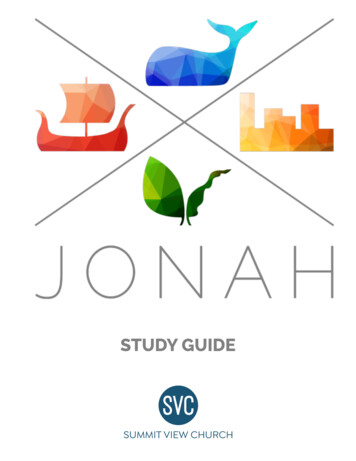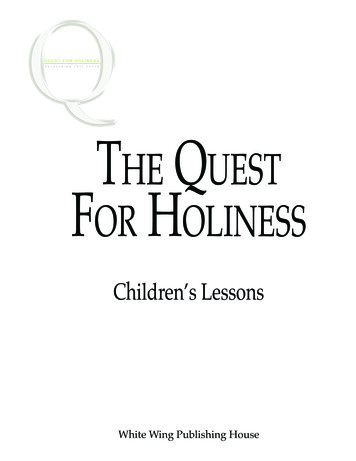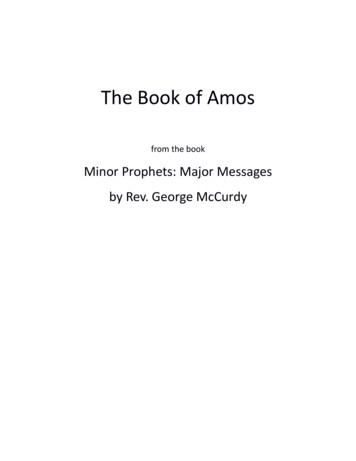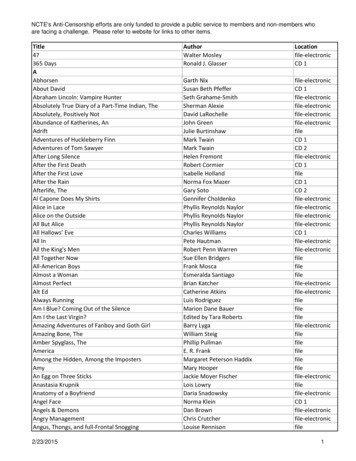
Transcription
THEBOOKOFJONAHWEEK 1WEEKJONAH 1:1-3Now the word of the Lcame to Jonah the son of Amittai, saying, 2 “Arise, go toNineveh, that great city, and cry out against it; for their wickedness has come up beforeMe.” 3 But Jonah arose to flee to Tarshish from the presence of the L . He went downto Joppa, and found a ship going to Tarshish; so he paid the fare, and went down into it, togo with them to Tarshish from the presence of the L .Jonah: From the Hebrew name(Yonah) meaning “dove”.Amittai: Means “my truth” in Hebrew.Nineveh: Nineveh was located east of the Tigris River in modern-day Iraq. It was morethan 500 miles east of Jonah’s hometown. Tarshish, in contrast, was west of Gath-hepher.In fact, Tarshish stood more than 2,500 miles from Israel in the opposite direction ofNineveh. It was the most remote destination available to Jonah. Jonah was trying to putas much distance as he could between himself and the Assyrians. Whatever happened toNineveh, Jonah would not be there to see it.Jonah’s reason for running was that, quite simply, he did not like the Assyrians. Assyriawas an idolatrous, proud, and ruthless nation bent on world conquest and had long beena threat to Israel.Nineveh had long been an enemy of Judah and Israel, the people of God. In 722 B.C.,the Assyrians defeated the northern kingdom of Israel, destroying its capital, Samaria.In 701 B.C., the Assyrians nearly conquered Jerusalem, the capital of Judah.The book of Nahum provides additional clues regarding God’s anger with the Ninevites.Nahum 3:1 says, “Woe to the city of blood, full of lies, full of plunder, never withoutvictims!” Nineveh was a city of violence, known for its brutal treatment of those itconquered. The Assyrians were notorious for amputating hands and feet, gouging eyes,and skinning and impaling their captives. The final verse of Nahum’s book emphasizesthe violence of the Assyrians in the form of a rhetorical question: “Who has not felt yourendless cruelty?” (Nahum 3:19).Did you know?This was the only case whereGod sent His prophet to a Gentilenation, instead of to Israel.3CALVARYCHAPELGREENVALLEY
THEBOOKOFJONAHWEEK 1JONAHI Questions & Comments1.Before we get into the study: Comment about your thoughts and understandingabout Jonah and the big fish. Fact or Fiction, explain.2.What command did God give to Jonah and why? When do you think God expectedJonah to respond to His instruction?3.What was Jonah’s response? Why do you think he responded in this way?4.Would your response have been any different? Explain.5.Imagine the world we live in today Do you believe it is in moral decay? Are theirthings that anger or frustrate you when you read, hear, or watch the daily news?What do you believe God’s Word says to us regarding His calling in our lives, inrelation to those around us? If possible, list the Bible references that support yourconclusion.4CALVARYCHAPELGREENVALLEY
THEBOOKOFJONAHWEEK 2JONAH 1:3-4But Jonah arose to flee to Tarshish from the presence of the L . He went down toJoppa, and found a ship going to Tarshish; so he paid the fare, and went down into it, togo with them to Tarshish from the presence of the LǝǚȰ.3But the Lsent out a great wind on the sea, and there was a mighty tempest on thesea, so that the ship was about to be broken up.4Nineveh was located 550 miles northeast of Samaria. This would have required Jonahto travel more than a month, if he journeyed the usual 15-20 miles a day. So not onlywas the city the largest in the world at the time (second only to Babylon; probably with apopulation of 600,000), and known for violence, but it was also quite a lengthy journeyfrom where he was. Jonah had numerous reasons for not wanting to go, but none wereGOOD reasons.“The name Nineveh is thought to derive from “ninus,” and means the residence of Nimrodor “nunu,” which means “fish.” The people worshiped the fish goddess Nanshe (thedaughter of Ea, the goddess of fresh water) and Dagon the fish god who was representedas half man and half fish. Isn’t it interested that the Ninevites were fish worshipers, andJonah was swallowed by a big fish? Anyway, this city was a center for idol worship, andwas later destroyed for that very reason.This is the only recorded instance of a prophet refusing God’s commission. If the locationis as suspected, it was as far west in the opposite direction as possible. Definite rebellion.H.C. Woodring says of it- “God wanted him to go to Nineveh, 500 miles northeast ofPalestine. Instead of going east, Jonah went 2000 miles to the west. God wished Jonahto take an overland trip via the Fertile Crescent. Instead he took a distasteful sea voyage(the Jews hated the sea). God sent him to the greatest metropolis of the day. InsteadJonah headed for a remote trading post on the fringes of civilization. The Lord wished togo with His prophet. Instead Jonah tried to flee from the presence and power of God.”5CALVARYCHAPELGREENVALLEY
THEBOOKOFJONAHWEEK 2JONAHI Questions & CommentsFrom Charles Spurgeon: In his sermon titled “Runaway Jonah, and the ConvenientShip”1.WE MAY NOT FOLLOW OUR IMPULSES TO DO WRONG. Jonah felt it come uponhim, all of a sudden, not to go to Nineveh, but to Tarshish. “Tarshish! Tarshish!” wasconstantly whispered in his ear, till he had Tarshish on the brain, and go he must.WE MAY NOT TAKE A WRONG COURSE BECAUSE IT SEEMS EASY. Jonah says, “Iwill go to Tarshish.” And he goes down to the port of Joppa, and there he finds aship just going to Tarshish. How easy a thing it often is to carry out an evil purpose!My dear hearers, whether you are Christians or are not Christians, I want to put youon your guard against the idea that, because a certain course in life is very naturaland easy, you may therefore follow it, though it is not right. Remember that the wayof destruction is always easy. “Wide is the gate, and broad is the way, and manythere be which go in.” The way to hell is downhill; and this is easy travelling.2.Have you ever found it to be true that when you are fleeing God, it leads to adownward spiral and that the enemy often provides a ship going in the oppositedirection? Jonah “paid the fare.”- has your running from God ever been costly?3.Did Jonah succeed in fleeing from the LORD? Turn to and read Psalm 139:7-12.Comment on what you just read. Feel free to read all of Psalm 139.4.What was the Lord’s response to Jonah’s disobedience? What did this display aboutthe Lord’s character and His power? V45.How did this endanger others traveling with him? V46CALVARYCHAPELGREENVALLEY
THEBOOKOFJONAHWEEK 3JONAH 1: 4-5But the Lsent out a great wind on the sea, and there was a mighty tempest on thesea, so that the ship was about to be broken up.Then the mariners were afraid; and every man cried out to his god, and threw the cargothat was in the ship into the sea, to lighten the load. But Jonah had gone down into thelowest parts of the ship, had lain down, and was fast asleep.5The mariners were probably Phoenicians, who believed in many gods, but not the trueGod. Phoenicians were known for their multi-theism and skill at sea. Note that the stormmust have been very severe if such seasoned sailors were afraid because of it.Psalm 107: 25-28 paints a vivid picture of the mighty tempest on the sea. “For Hecommands and raises the stormy wind, which lifts up the waves of the sea. They mountup to the heavens, they go down again to the depths; Their soul melts because of trouble.They reel to and fro, and stagger like a drunken man, and are at their wits’ end. Then theycry out to the Lin their trouble, and He brings them out of their distresses.”From Jon Courson: Sometimes God sends storms of severity in order to bringHis children into port safely. Such was Jonah’s case. This storm was not theresult of God’s punishment of Jonah, but His patience with Jonah. You see,had Jonah listened, through the howling wind of the storm, he could haveheard God’s voice saying,‘I’m not going to let you go, Jonah. I love you too much. So blow, wind, blow.’Not every storm, however, is the result of rebellion. Jesus sent His disciplesstraight into storms on more than one occasion not because they weresinning, but because they had need of strengthening – not to destroy them,but to develop them.7CALVARYCHAPELGREENVALLEY
THEBOOKOFJONAHWEEK 3JONAHI Questions & Comments1.Can you remember storms in your life that resembled the mighty tempestmentioned in Psalm 107? If so, how did you weather the storm?2.What were the mariners’ three responses to the storm? What does this say aboutthe severity of the storm?3.What was Jonah’s initial response to the storm?Comment: First Jonah went down to Joppa. Then he went down into the ship.Now we see that he went he even further down as he had gone down into thelowest parts of the ship. He was sinking, but he had not yet hit rock bottom.Disobedience to God always leads us down.4.What does Jonah’s initial response indicate about his character?5.The Lord caused a great wind to rise up and stir up a storm large enough tothreaten the ship Jonah was on as well as others traveling with him. Have you evernoticed that our sin splashes over to others? If so, please give personal examples,or examples of how someone’s sin can splash over to others.Matthew 8: 24-27: And suddenly a great tempest arose on the sea, so that the boatwas covered with the waves. But He was asleep. 25 Then His disciples came to Him andawoke Him, saying, “Lord, save us! We are perishing!” 26 But He said to them, “Why areyou fearful, O you of little faith?” Then He arose and rebuked the winds and the sea, andthere was a great calm. 27 So the men marveled, saying, “Who can this be, that even thewinds and the sea obey Him?”6.What hope can be gleaned from this passage?8CALVARYCHAPELGREENVALLEY
THEBOOKOFJONAHWEEK 4JONAH 1: 4-9But the Lsent out a great wind on the sea, and there was a mighty tempest on thesea, so that the ship was about to be broken up.Then the mariners were afraid; and every man cried out to his god, and threw the cargothat was in the ship into the sea, to lighten the load. But Jonah had gone down into thelowest parts of the ship, had lain down, and was fast asleep.5So the captain came to him, and said to him, “What do you mean, sleeper? Arise, call onyour God; perhaps your God will consider us, so that we may not perish.”6And they said to one another, “Come, let us cast lots, that we may know for whosecause this trouble has come upon us.” So they cast lots, and the lot fell on Jonah. 8 Thenthey said to him, “Please tell us! For whose cause is this trouble upon us? What is youroccupation? And where do you come from? What is your country? And of what people areyou?”7So he said to them, “I am a Hebrew; and I fear the L , the God of heaven, who madethe sea and the dry land.” (continue to read vs 10-16 for contrast)9JonahDid not appear to prayDeep in sleepIndifferent to sailors, their plightNo great concern to save the sailorsWanted to dieWanted to persist in sinDisobedient though he knew muchNo worshipSeemingly untouched by his sinMarinersPrayedActive to save the ship and selvesCompassion on JonahTried to save JonahWanted to liveWanted to find “sin”Obedient to what they knewWorshipped GodShuttered at Jonah’s sin9CALVARYCHAPELGREENVALLEY
THEBOOKOFJONAHWEEK 4JONAHI Questions & CommentsComment: I have often seen non-believers sometimes acting more like believersthan those professing faith in Christ.1.Can you share your thoughts?2.Why did the captain approach Jonah? V63.What did the captain’s question reveal about his faith in his people’s gods?In Jonah’s God? V64.How did they discover that the storm was Jonah’s fault? V7Food for thought:“The lot is cast into the lap, but its every decisionis from the LORD.”Proverbs 16:336.What did the outcome of casting lots reveal about God’s character and power? V77.What was the mariners’ response to the outcome of the lots? V8So he said to them, “I am a Hebrew; and I fear the LORD, the God of heaven, who madethe sea and the dry land.”9Notice that Jonah did not tell them that he was a prophet running from God. Hesaid “I fear the L .” The word fear means to stand in awe of.8.Was Jonah acting like he feared the LORD?9.How different is this response than the one Jonah gave: “The God Who made thesea and the dry land told me to go to Nineveh, But there’s no way I’m going becauseI hate the Assyrians”?10CALVARYCHAPELGREENVALLEY
THEBOOKOFJONAHWEEK 5JONAH 1: 10-16Then the men were exceedingly afraid, and said to him, “Why have you done this?” For the menknew that he fled from the presence of the L, because he had told them. 11 Then they said tohim, “What shall we do to you that the sea may be calm for us?”—for the sea was growing moretempestuous.And he said to them, “Pick me up and throw me into the sea; then the sea will become calm foryou. For I know that this great tempest is because of me.”12Nevertheless the men rowed hard to return to land, but they could not, for the sea continued togrow more tempestuous against them. 14 Therefore they cried out to the Land said, “We pray,OL, please do not let us perish for this man’s life, and do not charge us with innocent blood;for You, O L, have done as it pleased You.” 15 So they picked up Jonah and threw him intoexceedingly, andthe sea, and the sea ceased from its raging. 16 Then the men feared the Loffered a sacrifice to the Land took vows.13After Jonah told the mariners about the God he served, and they put it together with what he hadalready told them of his flight from God’s presence, they became extremely afraid. They askedhim how the sea could be made calm again, and he told them to throw himself into it. Fearful ofexercising this solution, the men rowed for land using their own strength, but failed. The stormworsened. Left with no other option, they called to God not to hold them responsible for Jonah’sblood and threw him in. Instantly, the sea calmed. Seeing His power, the mariners feared God,offered Him sacrifices and made vows.From Jon Courson: Folks, the problem with sin and rebellion is this: Innocentpeople get tossed around in our storms. You might say with great bravado,‘I’ll pay the fare. I’ll pay the price for my sin’ – but remember: others willget beat up and go down in the process. Our friends, children, spouses, andparents often pay the price for our foolishness and rebellion.11CALVARYCHAPELGREENVALLEY
THEBOOKOFJONAHWEEK 5JONAHI Questions & Comments1.Why were the mariners so frightened at Jonah’s response? What did the sailors sayin response? V102.What did the mariners’ question convey about their understanding of the situation?How had Jonah related to the sailors prior to the storm? V103.What did the mariners’ questions reflect about their concern for themselves? Whatdid the mariner’s questions reflect about their concern for Jonah and their attitudeof fair play? V114.What was Jonah’s answer to stopping the storm? What did this say about Jonah’sattitude concerning obeying the Lord? V125.How did the mariners try to solve the problem in their own strength? What was theresult of the mariners’ efforts? V136.How did the attitude of the mariners towards Jonah’s life compare with Jonah’sattitude towards the lives of the Ninevites? V14Comment: These mariners went from being exceedingly afraid of the storm tofearing the LORD exceedingly.7.How can that be?8.What specific events would have indicated to them that Jonah’s God was the trueGod, worthy of worship and praise? V1612CALVARYCHAPELGREENVALLEY
THEBOOKOFJONAHWEEK 6JONAH 1: 15-17So they took up Jonah, and cast him forth into the sea: and the sea ceased from her raging.Then the men feared the LORD exceedingly, and offered a sacrifice unto the Lvows., and made16Now the Lhad prepared a great fish to swallow up Jonah. And Jonah was in the belly ofthe fish three days and three nights.17Many Bible stories portray this great fish as a whale, but it was most likely not. Some thinkthe fish was a giant shark, and while there are sharks big enough to swallow a man whole, it isunlikely that such a man would survive being swallowed by a shark because of the jagged teeth.One of the biggest fish ever caught was 38 feet long, 18 feet around, weighing an estimated26,000 pounds. Its mouth opened about five feet wide and two feet high, plenty big enough toswallow a man. Numerous studies have been done to try to figure out what sort of fish this was,and how it swallowed Jonah.But none of this really matters for the story. The fact of Jonah being swallowed is anothermiraculous event, which need not have a scientific explanation or historical evidence. Godhad something He wanted Jonah to do, and He rescued Jonah from drowning in the sea bysending a fish to swallow him. The question, however, is how to view the fish. Is God deliveringJonah, or disciplining him? Is God preparing Jonah for the next step, or punishing Jonah forhis disobedience? The text does not give clear indications one way or the other, and is likely ancombination of both. God’s discipline sometimes comes through deliverance.13CALVARYCHAPELGREENVALLEY
THEBOOKOFJONAHWEEK 6JONAHI Questions & CommentsFrom Jon Courson: Jonah was in a tight spot, no doubt about it! Tight spots areinteresting because they will either make us bitter or make us better. The boilingwater that hardens the egg, softens the potato.1.How did God preserve the life of His prophet? V172.What aspects of this were miraculous? V173.How did this act display God’s mercy and grace in Jonah’s life and in the lives of theNinevites? V17Matthew 12 38-41: Then some of the scribes and Pharisees answered, saying,“Teacher, we want to see a sign from You.” 39 But He answered and said to them,“An evil and adulterous generation seeks after a sign, and no sign will be given toit except the sign of the prophet Jonah. 40 For as Jonah was three days and threenights in the belly of the great fish, so will the Son of Man be three days and threenights in the heart of the earth. 41 The men of Nineveh will rise up in the judgmentwith this generation and condemn it, because they repented at the preaching ofJonah; and indeed a greater than Jonah is here.4.“An evil and adulterous generation seeks after a sign, and no sign will be given to itexcept the sign of the prophet Jonah.” – What was the sign of the prophet Jonah?What are the implications for us today?From Chuck Swindoll: Jonah was one of only four writing prophets that Jesusmentioned by name during His earthly ministry (Isaiah, Daniel, and Zechariah werethe others). But Jonah received more than a mere mention. Jesus actually identifiedHimself with the prophet’s three-day sojourn in the belly of the great fish, noting it as aforeshadowing of His own death, when Jesus would spend three days “in the heart ofthe earth,” before His resurrection (Matthew 12:39–41). Jesus’ identification with theprophet at the lowest point of Jonah’s life finds echoes in the book of Hebrews, whereit teaches that Jesus “had to be made like His brethren in all things, so that He mightbecome a merciful and faithful high priest” (Hebrews 2:17). The book of Jonah stands14CALVARYCHAPELGREENVALLEY
THEBOOKOFJONAHWEEK 6as an important link in the prophetic chain, giving readers a glimpse of Christ’s deathand resurrection hundreds of years before they actually occurred.5.Jonah was in the belly of the fish for three days and three nights because of his sin.Jesus was in the earth three days and three nights because of our sin. Because ofGod’s great mercy and grace, neither one of them stayed there. – How are MERCYand GRACE seen in the Book of Jonah and in the life of Jesus?6.In week one we asked for your comment about your thoughts and understandingabout Jonah and the big fish. Have you gained any new thoughts or understandingabout Jonah? If so, what?15CALVARYCHAPELGREENVALLEY
THEBOOKOFJONAHWEEK 7JONAH 1:17-2:1Now the Lhad prepared a great fish to swallow Jonah. And Jonah was in the belly of thefish three days and three nights.172Then Jonah prayed to the Lhis God from the fish’s belly.Jonah cried out to the Lord from the belly of the great fish. He acknowledged his desperatecondition and his needy state, and his desire to return again to the Lord. He knew that the Lord,alone, had saved him.Nowhere is outside of the Lord’s presence, and He always hears the prayers of His children.I am never so low, so desperate, so sinful that I cannot turn to Him in repentance, and He willhear me.Salvation is from Him alone. I should not turn to others, or even myself for safety.Even in my deepest affliction, I should give thanks to the Lord.Being in the belly of the fish. What do you think that would have looked like, sounded like,smelled like, tasted like, felt like (tactile), felt like (emotional)? In week 2 we read Psalm 139.In light of this chapter, let’s reread Psalm 139:7-12.Where can I go from Your Spirit?Or where can I flee from Your presence?8If I ascend into heaven, You are there;If I make my bed in hell, behold, You are there.9If I take the wings of the morning,And dwell in the uttermost parts of the sea,10Even there Your hand shall lead me,And Your right hand shall hold me.11If I say, “Surely the darkness shall fall on me,”Even the night shall be light about me;12Indeed, the darkness shall not hide from You,But the night shines as the day;The darkness and the light are both alike to You.16CALVARYCHAPELGREENVALLEY
THEBOOKOFJONAHWEEK 7JONAHI Questions & CommentsComment from “Great is Your Faithfulness”: There is never a place where youcannot pray. If you are not praying, it is because you are choosing not to do so, notbecause you do not have opportunity .As a refresher, why was Jonah disobedient to God’s word to “Arise, go to Nineveh,that great city, and cry out against it; for their wickedness has come up before Me”?1.Without reading ahead, do you think Jonah had a change of heart regarding God’scall to go to Nineveh? Why or why not?2.Matthew 6:6 But you, when you pray, go into your room, and when you have shutyour door, pray to your Father who is in the secret place; and your Father who seesin secret will reward you openly. – Do you find it hard to pray? This may sound like astrange question, but where and when can we pray?From Jon Courson: Jonah didn’t pray the moment he was swallowed. Three daysand three nights passed before he prayed.3.Why do you think he waited so long?From Charles Spurgeon: What a strange place for prayer! Surely this is the onlyprayer to God that ever went up to God out of a fish’s belly. Jonah found himselfalive--that was the surprising thing--and because he was alive, he began to pray.If we live with death so near and in so great peril, and yet do not pray, what is tobecome of us? This prayer of Jonah is remarkable because it is not a prayer at allin the sense in which we usually apply the word to petition and supplication. It isalmost all thanksgiving and the best prayer in all the world is a prayer that is full ofthankfulness.4.Prayers of petition – supplication – thanksgiving. What’s the difference?17CALVARYCHAPELGREENVALLEY
THEBOOKOFJONAHWEEK 8JONAH 2:1-6Then Jonah prayed to the LAnd he said:“I cried out to the Lhis God from the fish’s belly.because of my affliction, and He answered me.“Out of the belly of Sheol I cried, and You heard my voice.For You cast me into the deep, into the heart of the seas, and the floods surrounded me;all Your billows and Your waves passed over me.3Then I said, ‘I have been cast out of Your sight; yet I will look again toward Your holytemple.’4The waters surrounded me, even to my soul; the deep closed around me; Weeds werewrapped around my head.5I went down to the moorings of the mountains; The earth with its bars closed behind meforever; Yet You have brought up my life from the pit, O L , my God.6What does this passage teach me about God?He is omnipresent. We cannot escape from Him. He hears the cries of His children. Hedisciplines His children. He not only sometimes throws us into difficult situations, butHe creates those situations for our good. He has brought up my life from the pit. He is incharge of creation, and it obeys Him. He is holy. Salvation is from Him.How does this passage apply to my life?I am never so low, so desperate, so sinful that I cannot turn to Him in repentance, and Hewill hear me.Salvation is from Him alone. I should not turn to others, or even myself for safety.Even in my deepest affliction, I should give thanks to the Lord.18CALVARYCHAPELGREENVALLEY
THEBOOKOFJONAHWEEK 8JONAHI Questions & Comments1.What did Jonah ask God for in this prayer? What is the general tone of this prayer?V1-92.Who was responsible for casting Jonah into the sea? Who caused the sea to berough and dangerous? V33.What was Jonah’s conclusion about his proximity to God after he was cast into thesea? Was his conclusion accurate? How did he respond to this conclusion? V4From Jon Courson: Seaweed wrapped around his head, fish slapping him in theface, the temperature a stifling 98.6, Jonah felt as though he was in hell.4.What are verses 5 & 6 describing? How did his near drowning affect Jonah?5.What was God’s reaction to Jonah’s near-death experience? V619CALVARYCHAPELGREENVALLEY
THEBOOKOFJONAHWEEK 9JONAH 2:6-10I went down to the moorings of the mountains;The earth with its bars closed behind me forever;Yet You have brought up my life from the pit,O L , my God.“When my soul fainted within me,I remembered the L ;And my prayer went up to You,Into Your holy temple.7“Those who regard worthless idolsForsake their own Mercy.8But I will sacrifice to YouWith the voice of thanksgiving;I will pay what I have vowed.Salvation is of the L .”910So the Lspoke to the fish, and it vomited Jonah onto dry land.From Matthew Henry: Men may shut us from communion with one another, but notfrom communion with God. To whom he prayed; to the Lord his God. This encourageseven backsliders to return. What his prayer was. This seems to relate his experience andreflections, then and afterwards, rather than to be the form or substance of his prayer.Jonah reflects on the earnestness of his prayer, and God’s readiness to hear and answer.If we would get good by our troubles, we must notice the hand of God in them. He hadwickedly fled from the presence of the Lord, who might justly take his Holy Spirit fromhim, never to visit him more. Those only are miserable, whom God will no longer own andfavor. But though he was perplexed, yet not in despair. Jonah reflects on the favor of Godto him, when he sought to God, and trusted in him in his distress. He warns others, andtells them to keep close to God.Those who forsake their own duty, forsake their own mercy; those who run away fromthe work of their place and day, run away from the comfort of it. As far as a believercopies those who observe lying vanities, he forsakes his own mercy, and lives below hisprivileges. But Jonah’s experience encourages others, in all ages, to trust in God, as theGod of salvation.20CALVARYCHAPELGREENVALLEY
THEBOOKOFJONAHWEEK 9JONAHI Questions & Comments1.Last week we finished with this question: What was God’s reaction to Jonah’s neardeath experience? V62.When did Jonah remember the Lord? V73.What does this indicate about man’s typical response in times of distress? V74.What happened to Jonah’s prayer? V75.What is the consequence of looking to idols for deliverance? V86.What are some examples of idols people today might have? V87.What impact does following these idols have on our relationship with God? V88.What was Jonah’s choice, when faced with turning to idols or to God? V99.What was Jonah’s sacrifice to the Lord? V910.Why was “the voice of thanksgiving” a sacrifice? V9”But I will sacrifice to You with the voice of thanksgiving; I will pay what I have vowed.sacrifice get rid of or put aside as though it doesn’t exist, especially incomparison to putting God firstthe voice of thanksgiving worship HimI will pay make right, complete, dowhat I have vowed promised, give to God11.How can we apply this concept to our lives? V921CALVARYCHAPELGREENVALLEY
THEBOOKOFJONAHWEEK 10JONAH 2:1010So the Lspoke to the fish, and it vomited Jonah onto dry land.From Enduring Word Commentary (Jonah out of the fish): Jonah’s deliverance cameafter Jonah’s repentance was complete. Jonah wasn’t just sorry for what he did; he wasnow trusting God again. In many believers today, there is a work of God, or an aspect ofHis deliverance that will remain undone as long as that believer resists Him and refusesto trust God.Jonah’s deliverance came after three days and nights had passed, providing aforeshadowing of Jesus’ resurrection. Jesus said, For as Jonah was three days and threenights in the belly of the great fish, so will the Son of Man be three days and three nightsin the heart of the earth (Matthew 12:40).When Jesus spoke of three days and three nights in Matthew 12:40, it does make aThursday crucifixion necessary. Rabbinic literature from the time of Jesus explains thatthe phrase “so many days and so many nights” was a figure of speech that could referto any part of a day and night. Ellison notes that Rabbi Eleazar ben Azariah (around theyear A.D. 100) said: “A day and a night make a whole day, and a portion of a whole day isreckoned as a whole day.” This demonstrates how in Jesus’ day, the phrase three daysand three nights did not necessarily mean a 72-hour period, but a period including at leastthe portions of three days and three nights.Pointing towards the Messiah to come, Jesus Christ, we see that Jonah’s deliverancecame after a remarkable demonstration of laying down one’s life. Jonah gave his life toappease the wrath of God coming upon others. But death did not hold him; after threedays and nights of imprisonment, he was alive and free.It is commonly thought that Jonah was vomited out on the shores of Nineveh – but weare not told that this was the case, especially because Nineveh is about 375 miles fromthe Mediterranean Sea. If Jonah did walk into Nin
THE BOOK OF JONAH WEEK 2 CAL V A R Y CHAPEL GREEN V ALLEY 5 JONAH 1:3-4 3 But Jonah arose to fl ee to Tarshish from the presence of the L Ý Ú 0. He went down to Joppa, and found a ship going to Tarshish; so he paid the fare, and went down into it, to go with them to Tarshish from the presence of the L Ý Ú 0. 4 But the L Ý










